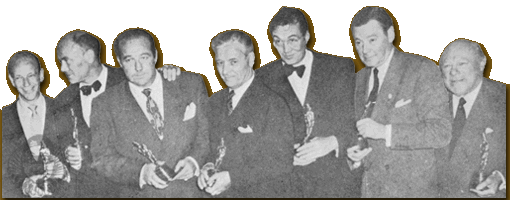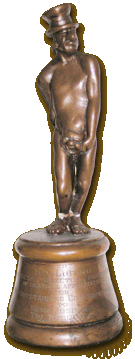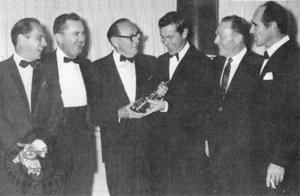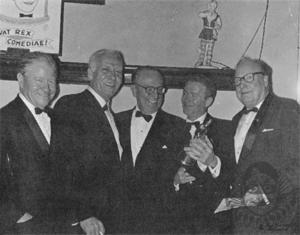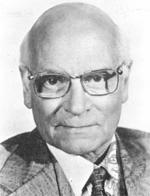 |
|||||||||||||||||||||||||||||||||||||||||||||||||

The Story of the George Spelvin Award > George Spelvin: His Life And Times
by Seán McClory from the Masquers Golden Anniversary Book (1975) We'd hazard a thought that almost everyone connected with 'legit theatre' is familiar with the tradition that any actor who plays two different roles in the same show often adopts the alias of "George Spelvin" for his second character. Many are the surmises as to the origin of this name, but the one given most credence is that one of the great producers, if not the greatest, on the American theatrical scene originated this alias. During early readings for one of his productions he suddenly realized to his horror that there were 13 characters in the play. Aquiver with righteous superstition and not wishing to offend the deities of the theatre by opening a new play with 13 actors in the cast, he hired only 12 and had one them double the 13th character. Presumably the actor did a complete change of wardrobe and makeup so that hopefully the audience wouldn't know that he was playing two parts. To further compound the subterfuge he was listed in the programme as playing the first role under his real name and his second role was accredited to "George Spelvin", a name created for the occasion by that super-superstitious late, great showman, David Belasco. Thus, it is opined, was George Spelvin thelegendary character created. Lap dissolve now to the Tavern of The Masquers Club. It is late afternoon in the spring of 1949. Three morosely silent figures sit huddled by the bar daintily sipping their afternoon tea. The butterball of the trio, the Club's artist in residence, yclept Donald Barclay, gracefully lowers cup and saucer and retracts his pinky. In jealous recognition of such exquisite form, a slight move of a Gioconda smile dimples the countenence of his companion, one George Ford, whose nimble fingers create dreams out of clay. Suddenly the reverent and hushed silence of the mote-filled Tavern is rent by a raucous English roar, "God's Bowels, Sirrah! I have it!
Spelvin was a difficult man to cast. All through the early firings his arms kept breaking off, and his present day demure posture owes itself not to any wayward whim of modesty on the part of his creators, but rather to the happy solution of a difficult casting problem.
Since that historic night twenty-seven years ago the floors of the Sycamore Avenue clubhouse have groaned with the weight of sixty-five studded Spelvin Award dinners. Time was when, once each year, The Masquers Club reached away from the apostles of the sock and the buskin to honour some top-flight civic personality with a testimonial dinner and by the presentation of a plaque suitably
We must restore that charming practice of honouring our lay brothers thusly, rather than what has lately been the practice of conferring Spelvins upon them. Indeed, in recognition of this lapse, The Jesterate has only recently voted overwhelmingly that none save those in the profession shall be a recipient of a Spelvin, " AN AWARD BY ACTORS FOR ACTORS." Now it is our singular pleasure to salute Groucho Marx who has joined "those select and golden few" as our latest Spelvin Honoree; to recall with pride the many illustrious men and women of the theatre who have preceeded ob this unique roll of honour, and yes, to raise a glass to ol' George S. himself who has takne his rightful place ib the theatre's Hall of Fame. George Spelvin His Life And Times by George Spelvin Some years ago, an actor said to his producer, "I can't play the cop in the first act and the bellboy in the third act and use the same name." With a flash of insight the producer said, "I never thought of that". And so the bellboy was played by George Spelvin, and an American theatre tradition was born. Since that day, some half of a century ago, George, like all legendary characters, has become accustomed to doing the impossible. In one night, for example, he has played in nine different theatres, appeared in eleven different roles, and was billed simultaneously in San Francisco, Chicago, St. Louis, Boston, and New York. In a three year period he has appeared in 20,000 performances in 210 different roles that have included everything from a Roman Gladiator, to a 20th Century (Fox) policeman. He is the theatre's Paul Bunyan. What Pecos Bill is to the cowboy, John Henry to the railroad, or old Stormalong to the New England sailor — George Spelvin is The Actor. There are, of course, other versions of his origin, but like Athena who, it is said, sprang from Zeus' brow, what really happened is a matter of conjecture. A favorite version of George's birth alleges that it happened on the spur of the moment on a cold winter's day in the Lamb's Club. The late Edward Abeles, about to appear in "Brewster's Millions," found that the producer was highly disposed toward junking the whole thing. Abeles was famous for inventing "authorities" to prove a point in his barroom debates, and as a last resort he decided to pull this old gag. In a break in conversation, Abeles casually mentioned that "Everything would be all right if George Spelvin were only here. HE would know what to do!" . . . The producer leaped at his name. "George Spelvin, eh? Well, if he's the man, we'll get him. Where is he?" "I don't know. I can try to contact him." "Do it!" Producers could talk to stars that way in those days. Abeles dashed to the bar and picked up the first man he saw. "Just say your name is George Spelvin, and tell 'em it's the greatest play you ever saw, just as it is. Tell 'em they're crazy if they don't put it on right now." The rest is theatrical history. The producer wrote out another check, and Brewster's Millions (1907) ran for 163 performances. The man in the bar was rewarded with a small part, and appeared on the program as "George Spelvin" -- the first of a long line. Famous theatrical names are linked with George. William Gillette first used him as a "double" in Secret Service. Maude Adams adopted George and first took him on a road tour. Jacob Adler of the Yiddish Theatre was perhaps the greatest actor to use the pseudonym. He has appeared, also, with variations throughout the years. The Moscow Art Theatre once listed the name "Gregor Spelvanovich" on their programs. Mrs. Frank Craven invented "Georgette Spelvin", George's daughter. George Jr., a long lost son, appeared in Salt Water and Gentlemen of the Press. In 1948 Alan Mowbray, a legendary character in his own right, and a Masquer of reputation, said, "Why can't we have an actor's award for Actors?" Alan was usually listened to by his colonial friends, and so it was that on August 17, 1949, George shed his cloak of anonymity and became the Masquer's official actor's award to actors.  |
|||||||||||||||||||||||||||||||||||||||||||||||||







